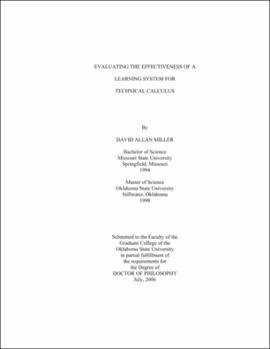| dc.contributor.advisor | Bertholf, Dennis E. | |
| dc.contributor.author | Miller, David Allan | |
| dc.date.accessioned | 2013-11-26T08:25:53Z | |
| dc.date.available | 2013-11-26T08:25:53Z | |
| dc.date.issued | 2006-07 | |
| dc.identifier.uri | https://hdl.handle.net/11244/6830 | |
| dc.description.abstract | Scope and method of study: The purpose of this qualitative and quantitative study was to describe the perceptions and experiences of participants that attended discussion sessions and/or used the Technical Calculus Learning Supplement (TCLS). This study also investigated the D-F-W rate, class attendance, and pre and post-algebra assessment scores between the participants and non-participants. Each participant completed a questionnaire over the TCLS, a questionnaire over the discussion sessions, pre/post algebra assessment, and a long interview with the researcher. In addition, the researcher recorded daily hits to each of the TCLS components using website counters. | |
| dc.description.abstract | Findings and conclusion: Students used the learning assessment measures (LAMS) the most; followed by the how to study mathematics; quick algebra review (QAR); quick trigonometry review (QTR); how to use the TI-83 calculator; and the applications from engineering technology components of the TCLS. Students revealed six different reasons why they used the TCLS website and revealed various reasons why they used each of the six components of the TCLS. Furthermore, participants and non-participants expressed nine different reasons why they did not use the TCLS during the semester. Other participants and non-participants stated three reasons why they used the TCLS in a more limited way. | |
| dc.description.abstract | Participants earn a significantly higher mean course grade than did non-participants. For those students that did not withdraw or quit coming to class, participants missed significantly fewer days in class than did non-participants. The results of this research showed that there was no significant difference in the pre-algebra assessment scores for participants and non-participants, nor was there any significant difference in the gain from the pre to post-algebra assessment scores for participants and non-participants. | |
| dc.description.abstract | The students revealed ten reasons why they attended the discussion sessions during the semester. Other students stated seven reasons why they did not attend the discussion sessions. Students attributed much of their success in the course to the three-step method that was used in the discussion sessions and stated that the discussion sessions helped them be more actively involved in their own learning. The students stated six different ways in which the discussion sessions helped them in the course. | |
| dc.format | application/pdf | |
| dc.language | en_US | |
| dc.rights | Copyright is held by the author who has granted the Oklahoma State University Library the non-exclusive right to share this material in its institutional repository. Contact Digital Library Services at lib-dls@okstate.edu or 405-744-9161 for the permission policy on the use, reproduction or distribution of this material. | |
| dc.title | Evaluating the effectiveness of a learning system for technical calculus | |
| dc.contributor.committeeMember | Aichele, Douglas B. | |
| dc.contributor.committeeMember | Wolfe, John E. | |
| dc.contributor.committeeMember | McCann, Melinda H. | |
| osu.filename | Miller_okstate_0664D_1900 | |
| osu.accesstype | Open Access | |
| dc.type.genre | Dissertation | |
| dc.type.material | Text | |
| thesis.degree.discipline | Mathematics | |
| thesis.degree.grantor | Oklahoma State University | |
